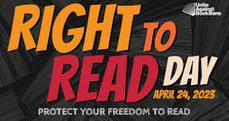 At the American Booksellers for Free Expression virtual panel Local Organizing to Combat Book Bans yesterday--Right to Read Day--panelists stressed that booksellers, writers, educators, librarians, and others need to organize locally in addition to nationally in large part because book banners have organized locally; that ever more bookstores should participate in Banned Books Week; that lawsuits work in some cases but not always, and First Amendment protections help in these battles; that bookstores should have policies and maybe even forms for people who object to the books they stock and events they hold; that booksellers can act as resources for concerned readers. They also reminded participants that the book bannings are part of larger, ongoing effort aimed at large swaths of Americans, particularly GLBTQ people, Blacks, and others. The panel was moderated by David Grogan, director of ABFE, and Ray Daniels, the ABA's chief communications officer.
At the American Booksellers for Free Expression virtual panel Local Organizing to Combat Book Bans yesterday--Right to Read Day--panelists stressed that booksellers, writers, educators, librarians, and others need to organize locally in addition to nationally in large part because book banners have organized locally; that ever more bookstores should participate in Banned Books Week; that lawsuits work in some cases but not always, and First Amendment protections help in these battles; that bookstores should have policies and maybe even forms for people who object to the books they stock and events they hold; that booksellers can act as resources for concerned readers. They also reminded participants that the book bannings are part of larger, ongoing effort aimed at large swaths of Americans, particularly GLBTQ people, Blacks, and others. The panel was moderated by David Grogan, director of ABFE, and Ray Daniels, the ABA's chief communications officer.

|
|
| Chris Finan | |
Chris Finan, executive director of the National Coalition Against Censorship and former head of the American Booksellers Foundation for Free Expression, provided some historical perspective, pointing out that this round of book banning is different and more difficult to fight than the last major round, in the 1980s. "Then there was more legislation" while now the challenges come "school district by school district." Still, recent developments have been positive, "allowing us to fight toe to toe," including the formation of Unite Against Book Bans initiative. UABB is supported by more than 70 national organizations and provides ways "to put people together at the local level because that's where the battle's being fought." He called it similar in approach to the effective organizational structure used by Moms for Liberty to ban books. Fina advised booksellers who become aware of censorship in the community to contact NCAC: "We will work with you."
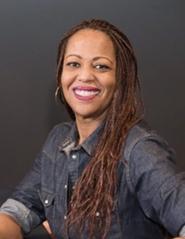
|
|
| Samiya Bashir | |
Samiya Bashir, executive director of Lambda Literary, said, "For my folks, this is personal. They're coming after us directly and deliberately. Our voices are to be shut down... This is one leg of ongoing attacks against us as people." It is important, she continued, for everyone to share and hear "from us and our stories," citing the example of the Lambda Literary's Writers in Schools program under which queer and trans writers visit New York City schools and discuss their books with students, who receive free copies of the books. "We know that troubles people because to have that conversation, where you are humanized, where you are normal, where you're a person that is dealing with life just like everyone else, takes down the walls." The bans, by contrast, aim to make "people afraid to even think about reading a book."
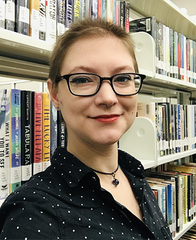
|
|
| Zoe Perzo | |
Zoe Perzo, content coordinator at the ABA and a former librarian, lives in Louisiana, where the legislative session just opened "with the same censorship bills we're seeing everywhere else." She said that based on her library experience, she recommends booksellers act as "a catalyst" for customers and patrons upset about book bannings, and steer them to appropriate groups and, if possible, make suggestions about contacting anti-book banning groups, creating and signing petitions, writing legislators, etc. She also recommended that booksellers have some kind of policy in place--and even a form to fill out somewhat like the forms many libraries have for book challenges. Sometimes people seeking to ban books in libraries or bookstores show up angry and looking for a fight. Booksellers should remain calm and have them fill out a form and ask for specifics. The process can defuse the situation somewhat, she said.
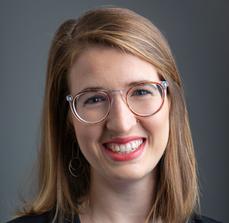
|
|
| Vera Eidelman | |
Vera Eidelman, staff attorney with the ACLU's Speech, Privacy, and Technology Project, noted that while lawsuits are one tool to fight book bans, they're not necessarily the best. She cited the importance of the First Amendment's right to receive information, which everyone has, including the right of students in schools to get access to information. The key Supreme Court decision in this area found that "schools cannot restrict or remove books from school library shelves because of political animus or because they disagree with the ideas contained inside of the books." Patrons in public libraries generally have stronger First Amendment rights, while in bookstores the question comes down to what is protected speech, but usually the standard is even higher.
Several of the panelists recounted current or past fights against book bans. Finan noted that many schools have pulled books in violation of their own policies that govern such actions. Last year, NCAC sent between 50 and 60 letters protesting violations of those policies. "It's a real cat-and-mouse game we're playing."

|
|
| David Grogan | |
Grogan noted that the ABA had sent a call to action to Texas booksellers to write to legislators to protest several bills, particularly one that calls for companies, including bookstores, that supply books to libraries in Texas to use a rating system for each title. More than 1,000 e-mail messages were sent in opposition to the bills, and one legislator received 347 messages against the bills.
Panelists and participants agreed on the importance of Banned Books Week, which will be held this year October 1-7. Finan called for a "maximum effort" to get every bookstore to participate "to make as big an impression as possible."
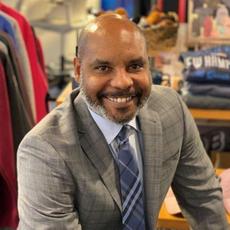 |
|
| Ray Daniels | |
Bashir likewise urged that Banned Books Week be made "larger and louder," perhaps by changing the focus each day so, for example, one day there would be talk about the banning of queer books, then another day the emphasis would be on the banning of Black books.
Daniels noted that Bookselling This Week is working on a Banned Books Week special issue.
Several people supported the idea of a campaign about how particular books saved readers' lives, and Grogan urged booksellers to sign an ABFE petition in opposition to book bans and challenges.

